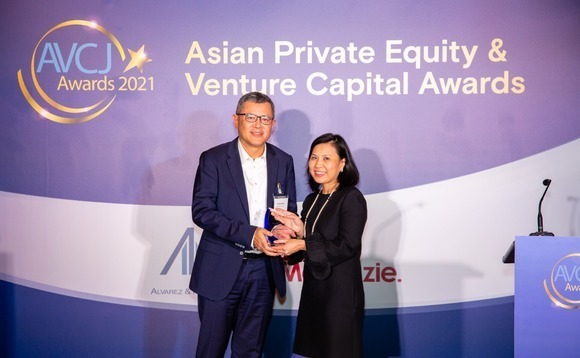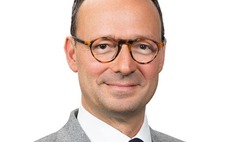
AVCJ Awards 2021: Firm of the Year – Large Cap: Baring Private Equity Asia

Baring Private Equity Asia claims that a thematic approach to origination and flexibility on deal structure allow it to pursue opportunities with greater conviction in a high-valuation environment
"You need growth today to justify the valuations we are seeing in the market. Unless you can underwrite strong growth, how do you make your return?" said Jean Eric Salata, CEO of Baring Private Equity Asia (BPEA). "That is an important part of our playbook: find growth sectors and have a plan to transform companies so they are more digital and benefit from those growth trends."
It has underpinned a prolific year for the private equity firm. Approximately USD 3.3bn of equity was deployed across eight deals with a combined enterprise value of USD 20bn in the 12 months ended September 2021. At the same time, USD 8bn in liquidity was generated, including USD 6bn in cash proceeds, through two trade sales, two IPOs, and assorted recapitalisations and other exits.
The common factor across new and realised positions – from Virtusa to Telus International, Hinduja Global Services to JD Health, and The CrownX to Hexaware – is not only growth, or even elevated valuations. It is a thematic approach to deal origination rooted in a handful of key areas where repetition leads to the accumulation of in-house expertise and the conviction to compete for assets.
Salata admits there are dynamics beyond BPEA's control. In a world where 10-year fixed-income returns are 1.5%, companies with cash flow profiles expanding at 20% per annum are commanding 20x multiples because that represents the present value of future cash flows. In this way, the multiples being paid for high-growth assets are the inverse of the interest rate.
Value creation can differentiate one proposal from others, but it is also the buffer PE firms build into investments in case growth scenarios don't play out as planned or multiples contract on exit. BPEA's thematic approach – driven by IT services, healthcare, financial services, and consumer – is based on a recognition that it cannot be competitive in every situation because it can't know everything.
"You must pick the areas you are most interested in, build expertise so you can really affect the outcome of an investment, and identify potential targets and go after them if they become available," Salata explained. "For example, if we see something in medical aesthetics in China, that's going to be a priority because we've looked at five other deals in the space and we liked them."
Into the cloud
This is arguably best demonstrated in technology services, where BPEA has made 10 investments, tracking a shift to cloud-based operations, an increase in demand for outsourced services that has accelerated due to COVID-19, and greater scope for niche providers. These trends are encompassed by three companies that featured prominently in 2021: Hexaware, Telus, and Virtuos Games.
Hexaware represented the firm's IT services debut in 2013. Jimmy Mahtani knew the business well from his time at General Atlantic (GA), which invested in Hexaware not long after he was recruited to build BPEA's India operation in 2006. A controlling position became available because NEC dallied over an acquisition, allowing BPEA to buy shares held by GA, ChrysCapital, and the promoter.
It took a 52% stake, launched an open offer for the rest and reached 71%, not enough to complete a privatisation. Undeterred, the GP embarked on a transformation of the company, moving from legacy support work characteristic of business process outsourcing (BPO) to digital solutions such as cloud applications and development. These now account for more than 60% of revenue.
"We honoured the price agreed by NEC, INR 135 per share, which was 6.5x EBITDA," said Mahtani, a managing director at BPEA. "At the time, Hexaware was relatively undermanaged and growing at 6.5% per year. We replaced 14 of the 15 top leaders, including the CEO, augmented the board, and brought in industry specialists. The CAGR [compound annual revenue growth] in our core digital segments was 18% through the life of the investment."
A sale of Hexaware to The Carlyle Group was agreed in autumn 2021 at a reported valuation of USD 3bn – versus USD 560m on entry – but this misses a crucial part of the story: on exit, BPEA owned the company outright, making it a much more attractive prospect to strategic and financial investors. That was the result of some quick thinking during the initial stages of COVID-19.
Like most private equity firms, BPEA responded to the pandemic at a portfolio level by scrutinising cash reserves and cost structures, as well as operational sustainability. Best practices were shared among the IT services companies, and it soon became apparent that a rebound was underway. Corporates were not cutting IT spend; in fact, they were investing in work-from-home platforms.
"Helped by some farsighted CEOs who introduced contingency measures, we were able to demonstrate to customers that we could still deliver services," said Kenneth Cheong, a managing director with BPEA in Singapore. "We saw a surge in business as other companies in the space were not able to react as quickly and meet their service level offerings in terms of security and privacy."
Nevertheless, Hexaware's stock remained stubbornly low. Having seen the price halve from its pre-COVID peak of INR 450, BPEA submitted a take-private proposal of INR 275 per share and eventually got a deal at INR 475 – a premium justified by the broader array of exit options. "If it weren't for the pandemic, I'm not sure we would have been able to get it done," Mahtani added.
Refining the model
If Hexaware helped establish BPEA's IT services playbook and COVID-19 reinforced the thesis, then Telus and Virtuos capture different aspects of its execution and evolution.
The Telus opportunity arose in 2016 because Canadian telecom giant Telus Corporation wanted an Asia-based partner to help develop what was essentially a call centre business. BPEA acquired 35% at a valuation of USD 930m and worked with management on a blueprint for transitioning into a digital-first customer support operation that blended voice services with email and chatbots.
Telus doubled down on fast-growing technology verticals and used bolt-on acquisitions to bring in new capabilities and customers such as artificial intelligence-enabled data cleaning and curation for Google and content moderation for Facebook. Meanwhile, an Asia-centric geographic footprint with a touch of Latin America and Eastern Europe was extended across Europe.
BPEA received USD 367.5m from the company's USD 1.06bn dual listing in New York and Toronto in early 2021, and another USD 405.3m from a secondary offering. This left it with a 26% stake worth USD 2.5bn as of mid-October 2021, implying an overall return – realised and unrealised – of 10x.
Exploring bolt-on acquisitions in certain verticals has contributed to the GP's direct investment activity. Nothing came of attempts to take Telus into healthcare IT, but BPEA picked up CitiusTech and AGS Health in 2019 and Hinduja Global Solutions in 2021. Meanwhile, a timely pivot by Coforge – also backed by BPEA since 2019 and partially exited last year – helped minimise COVID-19 impact.
"About 30% of the client base was in travel, tourism, and hospitality, and the rest was insurance, financial services, and a few other generic areas. They landed a large client during the downtown, so the financial services business grew 30-40% while travel contracted by 10%," said Mahtani. "It's not easy, but if you have existing reference points in sectors, it helps."
Virtusa was BPEA's largest acquisition of 2021 at USD 2bn, but it appealed because the revenue base is so concentrated in terms of sector coverage (financial services, technology, and healthcare) and customer (J.P. Morgan, Citi, Google, and Anthem). Virtuos, on the other hand, is a smaller pureplay pursued in part because of the growth Telus is seeing in its game developer services vertical.
"Our original investments in tech services were generic, with companies providing multiple service offerings. As we got more experience and knowledge, we identified sub-sectors where we saw growth potential or market tailwinds. It's on a flywheel with new things popping up and existing models changing," said Cheong.
"With Virtuos, we looked at ancillary areas in the gaming ecosystem. We differentiated ourselves in a competitive process through our knowledge of gaming and our ability to bring portfolio synergies."
Beyond buyouts
The Virtuos situation demonstrates BPEA's appreciation of the need for greater structural flexibility in execution as well as its thematic approach to deal sourcing. Had a significant control opportunity been available in the gaming space, the firm would have mounted a pursuit. But none were forthcoming, so it opted for a minority position in a high-growth business.
While buyouts remain core to BPEA's strategy, minority investments are increasingly significant. Around 10% of Fund VIII – which had surpassed its USD 8.5bn target as of year-end 2021 – is expected to be deployed in high-growth companies and special situations, with additional capital earmarked for corporate partnering.
"When you are organised around sectors, in addition to looking for buyout opportunities, you pay attention to what's happening in other types of investments or companies. If you don't do that, you risk getting blindsided," said Salata. "Sometimes, we see opportunities from a top-down perspective, but control isn't available, so we combine our buyout strategy with a very selective growth or minority strategy."
This played out to great effect with JD Health. BPEA's interest in healthcare IT was well-established, and within a China context, the most interesting opportunities were in consumer-facing online-to-offline (O2O) platforms offering telemedicine and prescription drug services. JD Health was the market leader, but online retail giant JD.com could hardly be expected to cede control.
BPEA participated in a USD 1bn round for the company in 2019 – committing capital from Fund VII – at a valuation of USD 7bn. JD Health listed in late 2020 and now has a market capitalisation of around USD 30bn. The private equity firm made a partial realisation by borrowing against the value of its shares, given this was considerably higher than the investment cost.
Other high-growth, minority investments include artificial intelligence chip designer Horizon Robotics. The CrownX, an O2O consumer-retail business controlled by Vietnam's Masan Group, qualifies as high growth and corporate partnering, much like JD Health. Meanwhile, Shinhan Financial Group and RBL Bank are special situations plays.
Strategic diversification of exposure at the portfolio level feeds into a broader debate at the fund level. In the past few years, real estate, real estate logistics, and credit vehicles have been introduced alongside BPEA's buyout offering.
"Each of our strategies has a different risk-return profile and different underlying exposure. We want to provide the most return for the least amount of risk at any point along the curve," said Salata. "Private markets are evolving and creating more ways for investors to get access to private company returns. We see ourselves as a partner for LPs in this process."
A broader platform
BPEA now numbers about 220 people. While investment teams continue to grow – typically by recruiting out of business schools with a view to promoting from within – it has bulked up across other areas as well. There is now an in-house debt capital markets function as well as more dedicated expertise across digital and IT, legal and risk, ESG, and investor relations.
Equipped with a platform capable of supporting multiple strategies, the firm has considered launching a growth fund to capture opportunities that might otherwise get overlooked. Long-dated capital structures could also be on the agenda, a concept Salata finds more interesting than permanent capital.
"The ultimate beneficiaries of what we do are mainly pension funds and retirees of those pension funds. When you are paying a monthly benefit off a pool of capital, that is easier with longer dated assets to match your longer dated liabilities," he said. "A 10-year asset is pretty good, but a 15-year asset is even better, if you can generate similar IRRs."
BPEA has experimented with different ways of extending the holding periods for companies deemed to have potential beyond the life of their funds. Nord Anglia Education was sold on to a later vintage fund – with Canada Pension Plan Investment Board coming in as a significant investor – in 2017 and EduCo International Group was spun out into a continuation fund backed by Coller Capital in 2019.
Assets suited to longer-dated funds, however, must demonstrate a certain kind of risk-return dynamic: the corporate transformation has been completed, and the business is stable enough to generate consistent, annuity-style returns over a 10-year period. Not everything fits this profile, as evidenced by the surge in sponsor-to-sponsor transactions in Asia.
BPEA has been a frequent participant in these deals, as buyer and seller. Outsourced content provider Straive and, more recently, corporate services specialist Tricor Global were both acquired from other financial sponsors, while Hexaware, the mapping business of Japan's Pioneer Corporation, and precision engineering business Interplex went in the opposite direction.
Hexaware attracted substantial interest from strategic investors as well as an assortment of global private equity players, and even as the field thinned from seven to three, Mathani wasn't sure which way it would go. However, Salata believes the momentum has shifted fundamentally towards financial sponsors – as evidenced by their willingness to bid up multiples.
"Until recently, you would have got a higher valuation from a strategic, but now private equity has moved it up," he said. "People look around and they want to buy growth. It goes back to that cash generative business, growing at 20% a year. In certain sectors, you can underwrite that."
Pictured: Gordon Shaw of BPEA and Baker & McKenzie's Tracy Wut
Latest News
Asian GPs slow implementation of ESG policies - survey
Asia-based private equity firms are assigning more dedicated resources to environment, social, and governance (ESG) programmes, but policy changes have slowed in the past 12 months, in part due to concerns raised internally and by LPs, according to a...
Singapore fintech start-up LXA gets $10m seed round
New Enterprise Associates (NEA) has led a USD 10m seed round for Singapore’s LXA, a financial technology start-up launched by a former Asia senior executive at The Blackstone Group.
India's InCred announces $60m round, claims unicorn status
Indian non-bank lender InCred Financial Services said it has received INR 5bn (USD 60m) at a valuation of at least USD 1bn from unnamed investors including “a global private equity fund.”
Insight leads $50m round for Australia's Roller
Insight Partners has led a USD 50m round for Australia’s Roller, a venue management software provider specializing in family fun parks.







